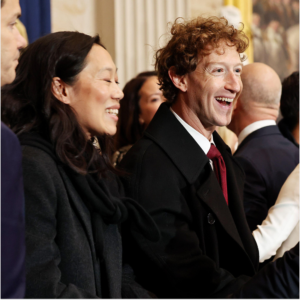15-year-old Helena Bruździak explores how disinformation and fake news are shaping political landscapes

Mark Zuckerberg and his wife Priscilla Chan at the inauguration of President Trump, 20 January 2025.
Picture by: Chip Somodevilla | Sipa USA | Alamy
Article link copied.
April 4, 2025
Online disinformation spreads far-right messaging worldwide
Social media has become an online war zone for disinformation and fake news, often amplified by far-right parties worldwide.
Last year, there was a notable rise in far-right, nationalist, populist parties securing seats in the European Parliament. For example, in France, Marine Le Pen’s National Rally (RN) party won the popular vote with over 31% of the vote. In Germany, the Alternative for Germany (AfD) party came second with 15.6%.
In the recent general election, AfD did even better, winning 20.8% and doing particularly well in what was former East Germany.
Simultaneously, there has been a worldwide shift towards more right-wing and conservative parties – for example, Donald Trump and the Republicans won the US election last November.
There can be many explanations for this political shift, though it is certain that the spread of disinformation and fake news online has had an influence on election outcomes.
“We see a lot of far-right movement content, and it seems that they have been more effective in using social media and the internet to promote their own agenda.” Andrzej Kozłowski, head of the narrative trend analysis and fact-checking team at Poland’s national research institute (NASK), told Harbingers’ Magazine.
Harbingers’ Weekly Brief
According to a NASK report, disinformation was spread online in an attempt to influence 2024 election results or undermine trust in democratic institutions and political parties in Mexico, Senegal, South Africa, Taiwan and the US. The US sanctioned Iran and Russia for attempting to interfere in the latest elections.
However, it is not only foreign interference that remains a cause for concern; but domestic as well.
The NASK report gave examples of pre-US election tweets by X owner Elon Musk that were meant to “instil fear that a potential loss in the presidential campaign will inevitably result in the end of American democracy.” This is a technique of disinformation called fear-mongering, where the goal is to use fear as a weapon against voters to influence the outcome.

Elon Musk at CPAC (Conservative Political Action Conference), February 2025.
Picture by: Gage Skidmore | Flickr
The report also said: “‘One of the most influential is Elon Musk, openly siding with the former US president, Trump. His partisan activity is particularly visible […] due to the enormous outreach he enjoys on his proprietary platform X.”
Concerns about Musk’s significant role in Donald Trump’s new administration are becoming worldwide with people raising the question of billionaires influencing politics, and how they can use their money to gain power.
Kozłowski says billionaires “might influence the mind and hearts of the people, through tools such as Instagram, YouTube, Google and Facebook. They are powerful tools, especially because the younger generation are taking most of their news from social media.”
In January, Mark Zuckerberg announced that his company Meta, the owner of Facebook and other social media apps, will end its use of fact-checking organisations and instead introduce community notes, similar to Musk’s policy on X. Kozłowski anticipates that the decision to remove fact-checkers in the US will eventually reach the EU and other countries.
Zuckerberg’s move was not necessarily a political decision, but it was a good choice economically. The Meta business model is based on the number of views a post receives. Kozłowski explains that “fake news generates higher profits, as they have a lot of views. Unfortunately, it’s profitable from the business perspective.”
However, Kozłowski stresses that there are other “more important factors” behind the rise of far-right parties worldwide than simply social media and the internet, such as domestic issues in each country.
Disinformation campaigns are all around us
Even though the issue of disinformation influencing politics has been around for a while, the first time it gained international attention was the 2016 US presidential election between Donald Trump and Hillary Clinton. Russia’s interference was undeniable, as described in the report from special counsel Robert Mueller.
According to Kozłowski, the success of Russian disinformation in 2016 comes from the surprise factor: “No one was prepared for it.” As a result, no one knew how to react and combat this issue.
Since 2016, Kozłowski says “no matter if it’s in the United States or Western Europe”, there is possible Russian or foreign interference. He affirms that foreign interference happened in the US elections in 2024 as well.
A recent example of disinformation happened in Romanialast December, when the election results were annulled by the constitutional court. The first round was won, unexpectedly, by Calin Georgescu, a far-right politician previously praised by Putin.
The courts decided to do this after declassified intelligence documentssuggested a mass influence operation from Russia interfered with the election. The disinformation campaign was led primarily on TikTok.
AI and deepfakes are the new girl in town
The impact of social media on disinformation has changed over time. Now, with the increasing use of AI, it has become easier to trick people into believing untrue rhetoric. Kozłowski believes that “by using AI, creating disinformation is cheaper, as you do not need very sophisticated abilities and a large budget to do it.”
He raises the issue of deepfakes(a video of a person in which their face or body has been digitally altered) as a type of AI that is particularly harmful, as people tend to believe that a video cannot be fabricated. “It will be easier to just make people believe that it is not artificially generated,” he says.
He mentioned a very popular exampleof this online, such as Trump and Biden fighting or kissing each other.
In January 2024, thousands of voters in New Hampshire were phoned via a fake voice,sounding like then-US president Joe Biden and instructing them not to vote in the state’s primary elections. This was a worrying example of just how easily elections can be distorted through the use of AI. It can even be used to plant doubt in citizens willing to participate in democratic processes.
The rise of anti-vaxxers
Disinformation campaigns do not only target politics, they can target things that affect our daily lives, such as healthcare. A striking example of this was the wave of misinformation surrounding Covid-19 vaccines.
Anti-vaccine narratives were fuelled by misrepresented scientific data, and influencers who capitalised on public fear and distrust. Some conspiracy theories falsely linked vaccines to government control, microchips, or population reduction, despite overwhelming scientific evidence proving their safety and effectiveness.
The anti-vax message was often spread by “natural health” influencers on social media, many of whom deny medicine as a whole let alone the existence of Covid-19. These claims were not only misleading but also dangerous, leading to vaccine hesitancy and, in some cases, preventable deaths.
Kozłowski calls anti-vax disinformation one of the “main trends”, adding “but of course, there are much more of them.”
Navigating the internet safely
From AI videos to disinformation campaigns, navigating the internet has become an increasingly difficult task. With social media platforms prioritising engagement over accuracy, false narratives can spread faster than ever.
Kozłowski believes we should all “start treating social media and the internet as a rather hostile environment, not as one where you can trust users”. He stresses that we need to approach what we see on the internet less emotionally and with increased critical thinking.
“If you find something which is controversial, which stirs up emotions and you want to immediately retweet it, reshare it, somehow comment on it, think first, because it could be an example of disinformation,” he advises.
Disinformation spreads so fast on social media because it “breeds from our emotions”. Things that shock, anger or scare us are more likely to be shared without a second thought. This emotional reaction is exactly what bad actors exploit to push false narratives and manipulate public opinion. Algorithms further amplify this by prioritising content that keeps users engaged.
The second piece of advice Kozłowski gives is to “find out alternative sources of information other than social media. I think this is the simplest advice.”
Written by:

Writer
Warsaw, Poland
Helena Bruździak was born in 2009 in Warsaw, Poland. She is passionate about writing, with a particular interest in history and English at school, and aspires to study law in the future. In March 2025, she launched a human rights subsection for the magazine called, Crisis Zones, alongside her peer, Kexin Shi, where they aim to raise awareness among young people about the challenges refugees and displaced people face.
In her free time, she enjoys listening to music, playing the piano, and reading poetry.
Helena speaks English and Polish, and is currently learning French.
Edited by:

🌍 Join the World's Youngest Newsroom—Create a Free Account
Sign up to save your favourite articles, get personalised recommendations, and stay informed about stories that Gen Z worldwide actually care about. Plus, subscribe to our newsletter for the latest stories delivered straight to your inbox. 📲
© 2025 The Oxford School for the Future of Journalism


